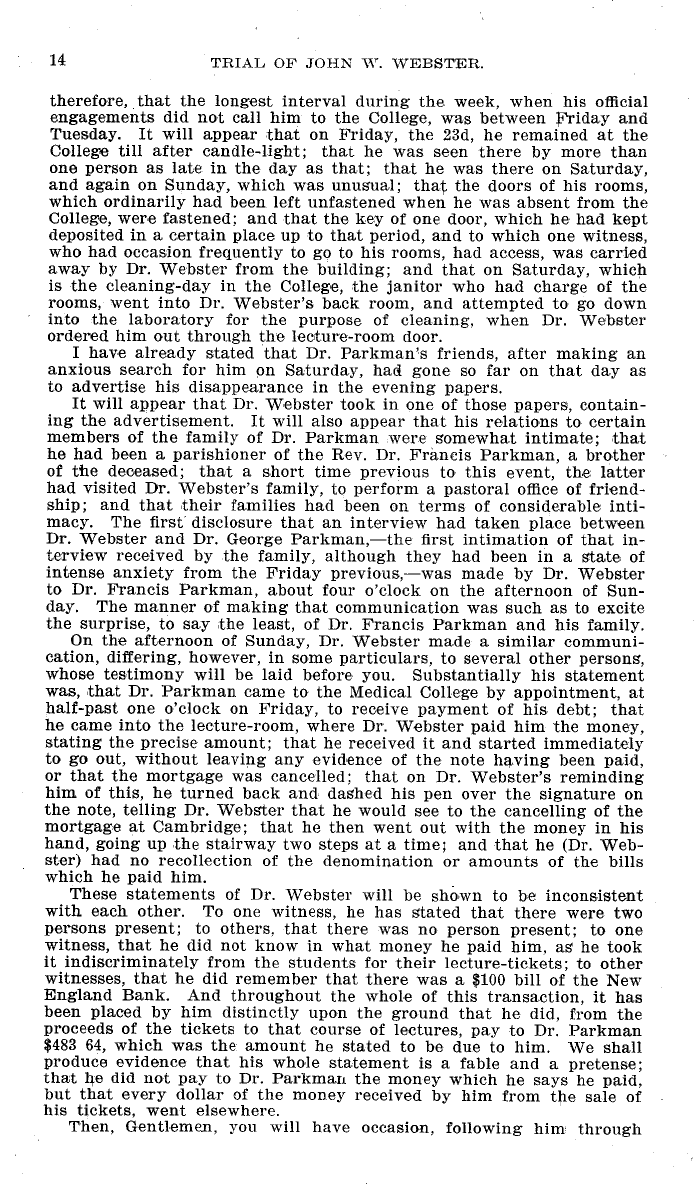|
14 TRIAL OF JOHN W. WEBSTER.
therefore, that the longest interval during the week, when his official
engagements did not call him to the College, was between Friday and
Tuesday. It will appear that on Friday, the 23d, he remained at the
College till after candle-light; that he was seen there by more than
one person as late in the day as that; that he was there on Saturday,
and again on Sunday, which was unusual; that the doors of his rooms,
which ordinarily had been left unfastened when he was absent from the
College, were fastened; and that the key of one door, which he had kept
deposited in a certain place up to that period, and to which one witness,
who had occasion frequently to go to his rooms, had access, was carried
away by Dr. Webster from the building; and that on Saturday, which
is the cleaning-day in the College, the janitor who had charge of the
rooms, went into Dr. Webster's back room, and attempted to go down
into the laboratory for the purpose of cleaning, when Dr. Webster
ordered him out through the lecture-room door.
I have already stated that Dr. Parkman's friends, after making an
anxious search for him on Saturday, had gone so far on that day as
to advertise his disappearance in the evening papers.
It will appear that Dr. Webster took in one of those papers, contain-
ing the advertisement. It will also appear that his relations to certain
members of the family of Dr. Parkman were somewhat intimate; that
he had been a parishioner of the Rev. Dr. Francis Parkman, a brother
of the deceased; that a short time previous to this event, the latter
had visited Dr. Webster's family, to perform a pastoral office of friend-
ship; and that their families had been on terms of considerable inti-
macy. The first disclosure that an interview had taken place. between
Dr. Webster and Dr. George Parkman,-the first intimation of that in-
terview received by the family, although they had been in a state of
intense anxiety from the Friday previous,-was made by Dr. Webster
to Dr. Francis Parkman, about four o'clock on the afternoon of Sun-
day. The manner of making that communication was such as to excite
the surprise, to say the least, of Dr. Francis Parkman and his family.
On the afternoon of Sunday, Dr. Webster made a similar communi-
cation, differing, however, in some particulars, to several other persons,
whose testimony will be laid before you. Substantially his statement
was, that Dr. Parkman came to the Medical College by appointment, at
half-past one o'clock on Friday, to receive payment of his debt; that
he came into the lecture-room, where Dr. Webster paid him the money,
stating the precise amount; that he received it and started immediately
to go out, without leaving any evidence of the note having been paid,
or that the mortgage was cancelled; that on Dr. Webster's reminding
him of this, he turned back and dashed his pen over the signature on
the note, telling Dr. Webster that he would see to the cancelling of the
mortgage at Cambridge; that he then went out with the money in his
hand, going up .the stairway two steps at a time; and that he (Dr. Web-
ster) had no recollection of the denomination or amounts of the bills
which he paid him.
These statements of Dr. Webster will be shown to be inconsistent
with each other. To one witness, he has stated that there were two
persons present; to others, that there was no person present; to one
witness, that he did not know in what money he paid him, as he took
it indiscriminately from the students for their lecture-tickets; to other
witnesses, that he did remember that there was a $100 bill of the New
England Bank. And throughout the whole of this transaction, it has
been placed by him distinctly upon the ground that he did, from the
proceeds of the tickets to that course of lectures, pay to Dr. Parkman
$483 64, which was the amount he stated to be due to him. We shall
produce evidence that his whole statement is a fable and a pretense;
that he did not pay to Dr. Parkman the money which he says he paid,
but that every dollar of the money received by him from the sale of
his tickets, went elsewhere.
Then, Gentlemen, you will have occasion, following him through
|

